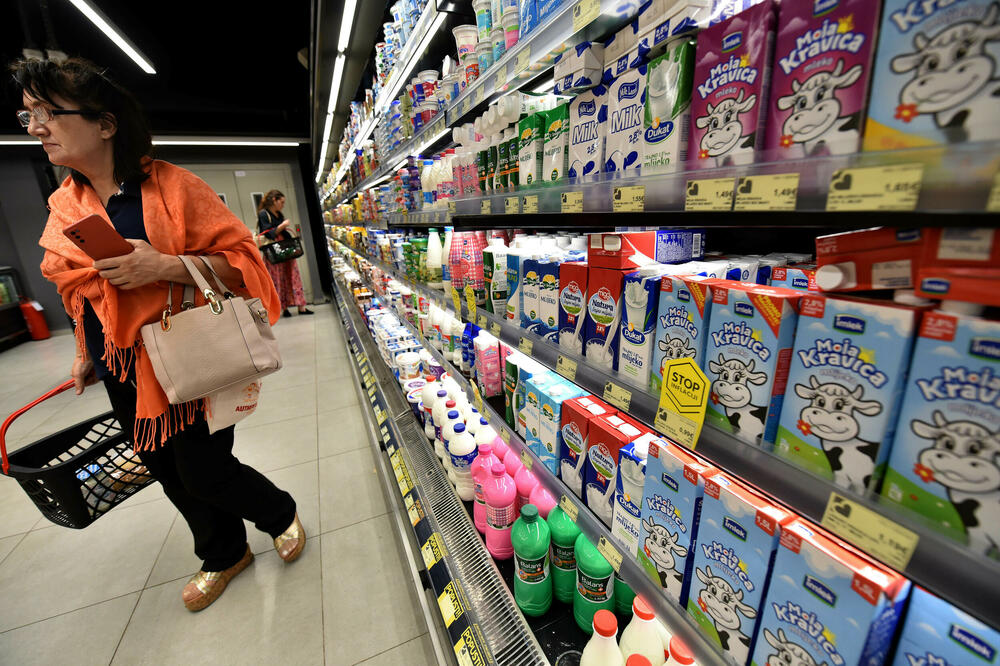Over the past three years, Montenegro has witnessed a staggering 43% rise in food prices, as reported by official data.
This surge coincides with a significant increase in profits for four major retail chains in the country: Voli, HD Laković, Idea-Franca, and Aroma.
These four giants collectively raked in a profit of 20 million euros just last year.
In Montenegro, market prices have been unregulated by law since 2006, leading to free market dynamics. Despite being competitors, these retail chains often display strikingly similar pricing for essential household items like salt, sugar, oil, and flour.
The Law on Protection of Competition strictly prohibits any agreement on price setting and margins.
Such uniform pricing across different chains raises suspicions of market collusion, a concern echoed by Andrej Plahutnik, a Slovenian expert and ex-leader of the European Commission's project aiding the Serbian antimonopoly commission.
Prohibited Agreements Under Competition
Law Article 8 of the Law on the Protection of Competition identifies illegal agreements, including those that:
1) Set or manipulate purchase or sale prices, directly or indirectly.
2) Restrict or control market production.
6) Impose obligations to adhere to specified resale prices or promote the enforcement of suggested resale prices.
Top Earners
In the Retail Sector Financial statement analyses reveal that the "Voli" chain quintupled its profits in comparison to 2020, while "Franca" tripled its million euro profits. HD Laković doubled its profits from 2.5 million to over five million euros.
"Aroma" turned a million euro loss into a nearly equal profit margin.
Company records over the last five years show combined earnings of 60 million euros for these chain owners. Dragan Bokan of "Voli" tops the list with almost 29 million in profits, followed by Komnen Laković and Hilmija Franca with 22 and seven million euros, respectively.

During this period, Montenegro's food prices soared multiple times, influenced by the pandemic, the "Europe Now" program's wage hikes, and market shortages due to the Russian invasion of Ukraine, culminating in prices significantly higher than neighboring countries.
Questioning the Trade Agreement's Role in Pricing
Plahutnik suggests the possibility of a market agreement but stresses the need for thorough analysis before concluding.
He recommends scrutinizing the causes behind uniform pricing, noting that small margin spaces often lead to similar prices. Regular monitoring of price changes in stock exchanges, major producers, and tax policies is essential.
Former Finance Minister Aleksandar Damjanović criticized retail chains for not lowering prices despite government cuts in fuel excise duties, labeling them as having the highest margins in Europe.
Despite these allegations, the Agency for the Protection of Competition has not conducted any investigations into Voli, Laković, Idea-Franca, and Aroma, as per their response to inquiries.

No complaints against these companies have been reported to the agency.
Agency's Stance on Market Control
The Agency, when asked about potential cartel associations due to uniform pricing across these chains, stated they had not conducted any investigations.
They emphasized that any suspicions would lead to an investigation initiated by the agency itself.
Regarding penalties for cartel associations and price fixing, the agency reported no such proceedings due to a lack of evidence for violations.
The agency also confirmed that they are currently analyzing the market prices.
European Union Practices and Expectations for 2024 Plahutnik notes that EU practices often initiate proceedings based on market irregularities. The results of the current analysis are anticipated in 2024.
From Prime Minister Milojko Spajić's office, despite promises, there were not any responses to inquiries regarding the repeated hikes in food prices and suspicions of price collusion.

Parliamentary Perspectives on High Margins MP Tonći Janović highlighted the unjustifiably high prices in Montenegro compared to the region and Europe, questioning the Agency's investigation into retail chain owners.
Dejan Đurović pointed out the direct link between high trade margins and inflation rates, using the example of wheat prices to illustrate his point.
Zdenka Popović inquired about the possibility of an oligopoly and monopolistic tendencies among these chains.
Plahutnik on Curbing Collusion
Plahutnik emphasizes the challenge of combating cartels in the EU, often relying on whistleblowers from within the cartels for evidence. He notes that EU penalties for illegal agreements are substantial.
Government Measures Against Inflation
Following the "stop inflation" action by the previous government, the current administration under Milojko Spajić announced no extension of the program, instead focusing on systemic anti-inflation measures and margin limitations.
Bonus video:





